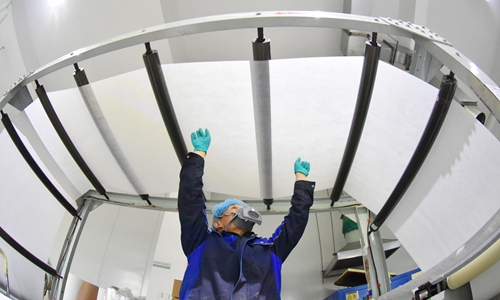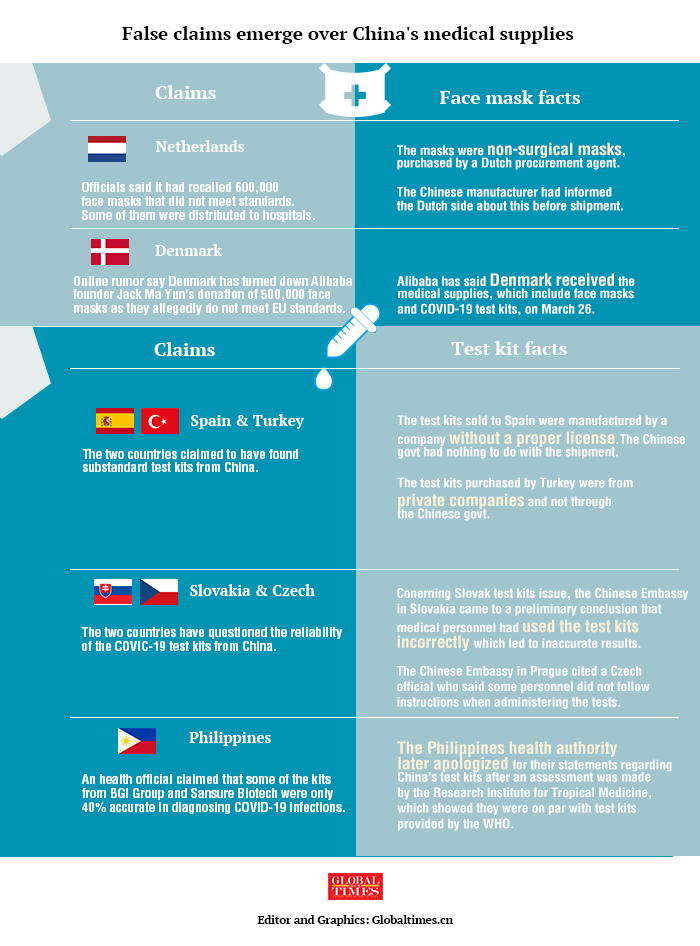HOME >> CHINA
False claims emerge over China's medical supplies
Source:Globaltimes.cn Published: 2020/4/2 23:53:58

A worker is busy on the production line of a medical gown manufacturer in Lianyungang, East China’s Jiangsu Province. Photo: cnsphotos
Recently, the Netherlands, Spain, Turkey, and Slovakia have questioned the quality of China's medical supplies amid the novel coronavirus (COVID-19) outbreak. Chinese officials have urged foreign nations not to politicize the issues and to tackle concerns in accordance with facts.
Health Ministry officials in the Netherlands said it had recalled 600,000 face masks that did not meet standard requirements. A local health authority confirmed with the Global Times the face masks were made by a Chinese company that had a KN95 quality certificate. The first shipment was delivered on March 21.
Chinese Foreign Ministry spokesperson Hua Chunying said at a regular press conference on Thursday that according to the preliminary investigation conducted by the competent authority on the Chinese side, the batch of masks in question was purchased by a Dutch procurement agent. The Chinese manufacturer informed the Dutch side before shipping out these products that they are non-surgical masks. Their export customs clearing procedures were also under the name of "non-surgical masks".
Last week, the Chinese Embassy in Spain announced on its official Twitter account that a shipment of so-called flawed test kits sold to Spain were manufactured by a company that did not have the proper medical license to sell its products. And the shipment had nothing to do with the government's purchase based on a recent list of companies recommended by the Chinese government.
Turkey also said it had found substandard antigen test kits from China, and were rejected before being used, the Financial Times reported. However, the test kits were purchased by Turkey from private companies and not through the Chinese government.
While Slovak officials questioned the reliability of the COVID-19 test kits from China, the Chinese Embassy in Bratislava contacted the manufacturer and came to a preliminary conclusion that medical personnel had used the test kits incorrectly which led to inaccurate results, China's foreign ministry said at a press conference on Monday.
Also, media in the Czech Republic reported that up to 80 percent of the rapid COVID-19 test kits from China have functional issues, but deputy health minister of the Czech Republic Roman Prymula refuted the claim saying, "The 80 percent error rate is not true."
The Chinese Embassy in Prague cited a Czech official who said some personnel did not follow the instructions when administering the tests.
Undersecretary of Health in the Philippines claimed that some of the kits from BGI Group and Sansure Biotech were only 40 percent accurate in diagnosing COVID-19 infections, and that some of them would have to be discarded, according to media reports.
However, the Philippines health authority later apologized for their statements regarding China's test kits after an assessment was made by the Research Institute for Tropical Medicine, which was on par with test kits provided by the World Health Organization (WHO).
Meanwhile, a disinformation campaign also targeted Chinese business representatives who have donated medical supplies overseas. For example, a widely circulated online post said Denmark refused Jack Ma Yu, founder of Alibaba's donation of 500,000 masks for allegedly not meeting EU standards.
Alibaba dismissed the claim, calling it was an online rumor, and said Denmark had received the medical supplies which included face masks and COVID-19 test kits on March 26.

Infographics:GT